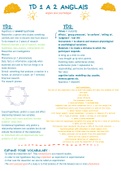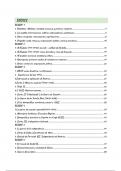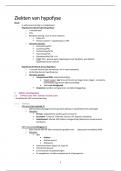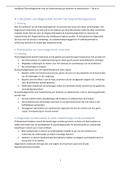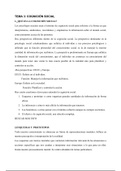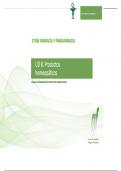TD 1 A 2 ANGLAIS
anglais pour psychologue
TD1: TD2:
Hypothesis or several hypotheses Values = modalités
Researcher: a person who studies something effects’, ‘group pressures’, ‘to conform’, ‘willing to’,
carefully and tries to discover new facts about it ‘judgment’, ‘real life’.
To do research or 2 pieces of research Instruments = to observe and measure physiological
Research example: a set of research, includes or psychological variations.
hypotheses, data analysis, interpretation etc. Materials = to create a stimulus to which the
Researches are investigations participant responds.
Measure to bring up a child: to raise.
Phenomena (or 1 phenomenon) I was brought up by strict parents.
Data: facts or information, especially when Parenting styles: authoritarian (rules),
examined and used to find out things or to authoritative (rules + explanation &
make decisions. responsibility), permissive (no boundaries, very
Stimuli: something that produces a reaction in a few rules)
human, an animal or a plant. (or 1 stimulus) cognitive tasks: modelling clay, puzzles,
Empirical research: memory games etc.
The research process: Apparatus = dispositif
Asch experiment:
The aim of this experiment was to show how people will deny the evidence of their
own eyes
and yield to
group influence
The procedure involved:
1 naive participant– 5 confederates
Judgment task: say which comparison line (1 ,2 ,3)= the target line.
Confederates told to give wrong answers on some of the trials.
1. Which factors reduce conformity?
Causal hypotheses: predict a cause and effect
IV1= Social support; values (modalités) = presence vs. absence of a partner
relationship between two variables. IV2 = Type of answer; values = written vs. oral answer
ex: Exams with many questions increase 2. What is being measured?
students’ stress level. How many times the subjectgoes alongwith the group (37 %). DV = level of conformity .
3. What are the results?
Correlational hypotheses: only predict a Participants went alongwith the group on 37% of the trials. However, …
relationship between two variables but do not Conformitydrops to5% whenthere is social support (IV1)
indicate the direction of the relationship. Conformitydrops by 2/3rds when the answer iswritten (IV2)
4. What conclusion can be drawn from this experiment?
ex: Individuals who are depressed also have There are two types of conformity:
problems of self- esteem. Informational (distortion of judgement) vs.
normative (to avoid the discomfort of the group).
EXPAND YOUR VOCABULARY :
•So what do researchers do? They conduct/carry out research studies.
•In order to test hypotheses they may implement an experiment or experimentation
•In that case the researcher can also be called an experimenter.
•The aim/ purpose/ goal of a study is to find evidence of the link between two or more phenomena
anglais pour psychologue
TD1: TD2:
Hypothesis or several hypotheses Values = modalités
Researcher: a person who studies something effects’, ‘group pressures’, ‘to conform’, ‘willing to’,
carefully and tries to discover new facts about it ‘judgment’, ‘real life’.
To do research or 2 pieces of research Instruments = to observe and measure physiological
Research example: a set of research, includes or psychological variations.
hypotheses, data analysis, interpretation etc. Materials = to create a stimulus to which the
Researches are investigations participant responds.
Measure to bring up a child: to raise.
Phenomena (or 1 phenomenon) I was brought up by strict parents.
Data: facts or information, especially when Parenting styles: authoritarian (rules),
examined and used to find out things or to authoritative (rules + explanation &
make decisions. responsibility), permissive (no boundaries, very
Stimuli: something that produces a reaction in a few rules)
human, an animal or a plant. (or 1 stimulus) cognitive tasks: modelling clay, puzzles,
Empirical research: memory games etc.
The research process: Apparatus = dispositif
Asch experiment:
The aim of this experiment was to show how people will deny the evidence of their
own eyes
and yield to
group influence
The procedure involved:
1 naive participant– 5 confederates
Judgment task: say which comparison line (1 ,2 ,3)= the target line.
Confederates told to give wrong answers on some of the trials.
1. Which factors reduce conformity?
Causal hypotheses: predict a cause and effect
IV1= Social support; values (modalités) = presence vs. absence of a partner
relationship between two variables. IV2 = Type of answer; values = written vs. oral answer
ex: Exams with many questions increase 2. What is being measured?
students’ stress level. How many times the subjectgoes alongwith the group (37 %). DV = level of conformity .
3. What are the results?
Correlational hypotheses: only predict a Participants went alongwith the group on 37% of the trials. However, …
relationship between two variables but do not Conformitydrops to5% whenthere is social support (IV1)
indicate the direction of the relationship. Conformitydrops by 2/3rds when the answer iswritten (IV2)
4. What conclusion can be drawn from this experiment?
ex: Individuals who are depressed also have There are two types of conformity:
problems of self- esteem. Informational (distortion of judgement) vs.
normative (to avoid the discomfort of the group).
EXPAND YOUR VOCABULARY :
•So what do researchers do? They conduct/carry out research studies.
•In order to test hypotheses they may implement an experiment or experimentation
•In that case the researcher can also be called an experimenter.
•The aim/ purpose/ goal of a study is to find evidence of the link between two or more phenomena

